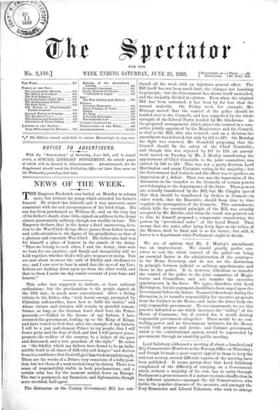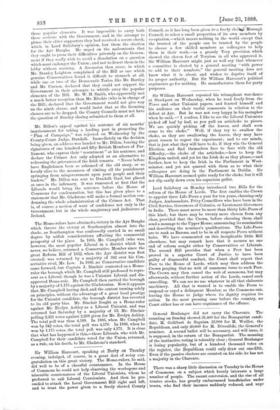Lord Salisbury addressed a meeting of about a hundred and
fifty Conservative Members at the Foreign Office on Thursday ; and though he made a most urgent appeal to them to keep the strictest secrecy, several different reports of the meeting have been published. It seems pretty clear that Lord Salisbury complained of the difficulty of carrying on a Government which, without a majority of its own, has to carry through Parliament a great measure of a nature to create disaffection in two different quarters,—amongst the old Conservatives, who dislike the popular elements of the measure, and amongst the Tory Democrats and Liberal Unionists, who wish to enlarge
those popular elements. It was impossible to carry both these sections with the Government, and in the attempt to please their older supporters they had received a severe check, which, in Lord Salisbury's opinion, lost them the election for the Ayr Burghs. He urged on the malcontents that they ought to press their difficulties privately on the Govern- ment if they really wish to avoid a dissolution on a question which must endanger the Union ; and not to desert them in the lobby without warning. A discussion then arose, in which Mr. Stanley Leighton complained of the Bill as one which genuine Conservatives found it difficult to stomach at all, while one or two of the Democratic Tories, like Mr. Bartley and Mr. Curzon, declared that they could not support the Government in their attempts to whittle away the popular elements of the Bill. Mr. W. H. Smith, who apparently met a much better reception than Mr. Ritchie (who is in charge of the Bill), declared that the Government would not give way on the ninth clause, and would insist that as the licensing clauses are to be dropped, the County Councils must not have the question of Sunday closing submitted to them at all.







































 Previous page
Previous page